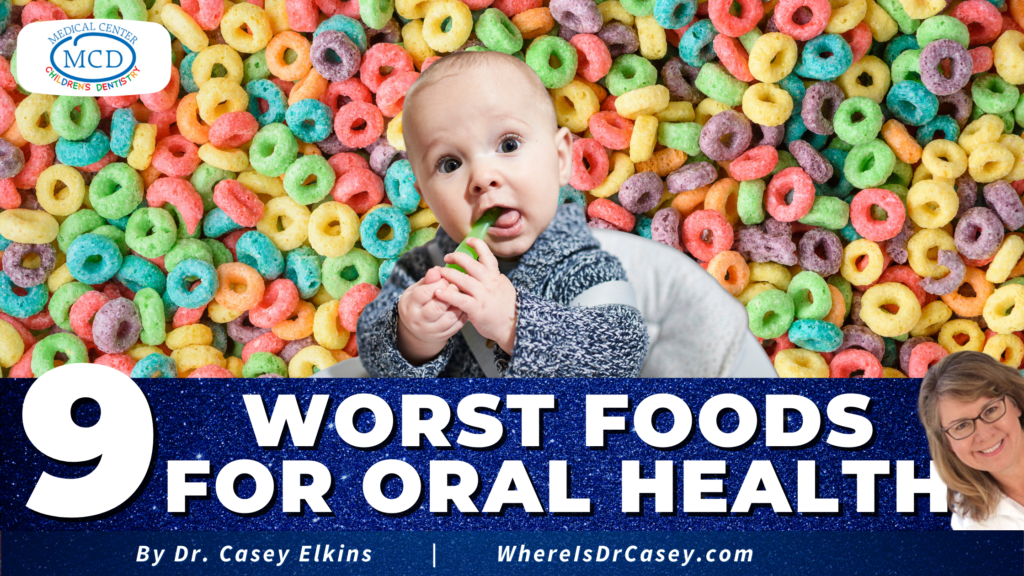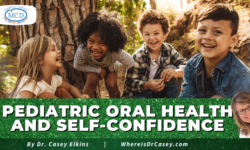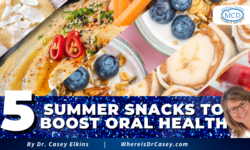
When it comes to our children’s health and food, we often prioritize avoiding sugary and sweet foods! However, there are many foods that we don’t think of that can be harmful to our family’s teeth and our oral health.
Here are some of the foods Dr. Casey informs her patients' parents about regularly.

Most parents are aware that citric fruits contain a good amount of vitamin C, among many other vital nutrients! However, fruits such as oranges, grapefruits, lemons, and limes are quite acidic, in fact, they are the most acidic fruits.
Lemons and grapefruits are the most acidic among these. They can even cause damage to our tooth enamel over time. Enamel is the hard, outer layer of our teeth! It is the part of our teeth most at risk for decay and erosion.
Of all of these fruits and the forms they come in, orange juice is thought to be the least acidic and poses the smallest risk of enamel damage over time. There are also many store-bought varieties that include the addition of vitamin D and calcium for the benefit of our oral health.
For these fruits and juices crafted from them, your child can still consume them! They have many benefits and health qualities. We just recommend having them rinse immediately after.

Candies are one of the answers that may seem “obvious” to some parents. There are definitely some candies that are healthier to have a treat than others. However, you’d be surprised how many candies may not be as bad as you think.
Sticky Candies are one of the worst foods for your teeth. These candies are known to stick on and in between the teeth for extended periods of time. This gives the bacteria in our children’s mouths a smorgasbord of deposited sugars to feast on.
These bacteria use the sugar as fuel to create acid, which then dissolves and destroyed the tooth enamel. These extra chewy candies include…
- Stretchy taffy
- Sticky caramels
- Sour Candies
Sour candies are known as the trifecta among candies. They are usually sticky, they contain high amounts of sugar, and they also have an acidic component. This extra acidic component is typically what adds the signature sour taste to these treats.

Hard candies usually have the same dangers as sticky candy, as they may not cling to your teeth in the same manner. However, they still pose their own risks for those who consume them.
While hard candies may stick as much, their hard, dense composition can be harmful to teeth as well. This is especially true for those who have habits of chewing on ice or other things. Biting down on one of these can lead to chipped teeth, it’s no wonder they call some of them “jawbreakers.”
The other issue with hard candies is that they take longer to consume and often are allowed to dissolve in our mouths. This inherently means that they will be repeatedly costing and saturating your child’s mouth with sugar for several minutes at a time. This length of exposure allows the bacteria more time to produce their harmful, acidic byproduct.

One of the vital ingredients to making pickles is the acidic quality of the vinegar used in the process. This is what gives pickles a sour and salty taste. In other words, pickles wouldn’t be pickles without acidity.
This doesn’t change that acidic foods are not good for our teeth and their enamel. There are even studies proving that highly acidic diets and diets that include regular consumption of vinegar or pickles have an increased risk of tooth erosion.
Most people don’t consume pickles often enough to cause significant damage to their enamel or teeth. However, overindulging can. This is why we recommend that pickles are given to children in small servings as occasional treats.

Much like Candy, carbonated sodas contain high quantities of sugar. Drinking lots of sodas can create the perfect environment for developing cavities.
Many parents don’t realize that these carbonated, sugary drinks have been shown to be more harmful than non-carbonated, sugary drinks. When tested many are found to be more acidic and corrosive than the alternative non-carbonated juice drinks.
Sodas also decrease our saliva production, which means that we are less efficient at naturally washing away leftover food debris, sugar, and cavity-forming bacteria.
There are some studies that even suggest that diet sodas are more erosive to teeth because they contain citric acid which binds to the calcium, which ultimately removes it slowly from our tooth surfaces.
If you treat your child to a carbonated soda as a treat, it is better for them to have it with a meal. Sipping on a soda throughout the day can be more hazardous than with food that can help neutralize the acids. Shortening the time your child’s teeth are exposed to such acids can make a big difference.

It is absolutely true that 100% have many benefits for our overall health just based on the nutrients that they contain. However, drinking them too often can negatively impact your child’s oral health.
Most fruit juices contain high levels of natural sugars and are highly acidic. These components can cause cavities and also erode tooth enamel as well. The fruit juices that tend to be the most acidic are grape, orange, apple, and lemon juice. The same is true for juice-based fruit pops, in fact, the additional sugar even increases the potential Dana get they can cause.
A dental study including over 16,000 pediatric participants in 2016 showed that there was a direct correlation between increased consumption of highly acidic juices and tooth erosion during childhood.
A German dental study in 2016 even found that apple and orange juice are 5x more erosive to sample teeth (cattle) than Coca-Cola light.
If you think sports drinks may be a “healthy” alternative for your child, you may want to think again! They can be just as damaging to your children’s teeth as soda and sugary fruit juices.
In fact, industry-leading products by Gatorade and Powerade also lead the way for tooth erosion over time. Most sports and energy drinks fall into this category too regardless of the brand.

The reason that these foods increase the chances of your child developing tooth decay is due to the presence of refined carbohydrates. They convert very quickly to sugar, usually still while in the mouth being chewed. These are the sugars that cavity-causing bacteria love.
The consistency of crackers causes them to become mushy when chewed. This “paste-like” goop builds up on your molars and gets lodged between teeth. If your child consumes lots of crackers, we recommend thoroughly brushing and flossing to remove debris.
While bread breaks down into a slightly different consistency than crackers when chewed, they still can contribute to the same issues as crackers. Be sure to encourage your child to consume lots of water while eating bread-heavy meals. It is very efficient at washing away leftover particles and the sugar it leaves behind.
Other starchy foods, such as potato chips can also produce similar results among patients who consume them regularly. We recommend always following starchy foods with a sufficient glass of water.

Ice is just water, so letting kids chew it causes no harm or foul, right? Wrong!
Many parents are surprised to learn that they need to be vigilant of how and when their children consume ice, especially younger kids. Ice can actually pose a number of dangers to your child’s teeth even though it’s just frozen ice.
Children who chew on ice, or any hard substances, engager the well-being of their teeth and tooth enamel. The hardness of ice can crack, chip, damage dental crowns, or even break teeth! For small children, ice can also be a choking hazard.
We understand the value of ice and a cool drink in central Texas. However, we always recommend that small children use sippy cups or age-appropriate drink containers that prevent them from accessing the ice directly. Please discourage any children who chew on the ice regularly, even if the reason is simply anxiety.

Since fried fruits are fruits, many people assume they are healthy snacks for their children. They may be fruits, but when dried they become more sticky and can cling to your child’s teeth.
Some of the most common dried fruits that American children consume are…
- Apricots
- Prunes
- Figs
- Cherries
- Raisins
The American Dental Association (ADA) even states that dried fruits should be eaten with caution, as the risk of cavities is due to the sugar residue it leaves on and in between teeth. If your child loves dried fruit, the best thing to do is be sure they are drinking enough water to wash away the sugar. It is also vital that you keep them on a consistent brushing and flossing routine too!
Even though these foods are not the best for our family's oral health, they are okay to eat in moderation. This is especially true for those who maintain good oral health and positive daily habits. Brushing twice per day and regular visits to the dentist can make a big difference in a child's long-term dental health. Learn more about which foods are healthiest and which foods are not here.







14 Responses